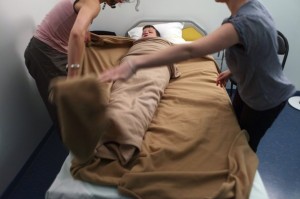The post you will read by guest bloggers, Laurence Le Blet and Karen Hatungimana, and a linked essay by Nicolas Joncour, are about the situation for nonverbal autistic people in France currently. I was unpleasantly surprised to learn how behind France is in educating people who have autism or in supporting children and families. I have many complaints about the system here in my own community but I know that I have been very lucky too. While an unwelcoming school or an incompetent aide has been part of my experience and has negatively impacted me, it has not been my entire experience. The opportunities I have been given to get a normal education, to have a trained aide with me in school, to have the chance to get a college degree and even to become an advocate for people with autism has been a blessing I cannot take for granted. It is time to change the paradigm about autism in France.
“The Right to an Education”, Article Typed by Non-Verbal Autistic Piano Student with Dyspraxia
Guest Post
by Laurence Le Blet and Karen Hatungimana
The situation in France for autistic people has progressed very little for many years. The professional orientation of case-managing organizations, medical-social institutions and specialist doctors is still largely psychoanalytic. The National Health Authority, (HAS), does not recommend psychoanalysis, and specifically condemns the “ le packing” treatment (in which a patient, wearing only underclothes, or naked in the case of small children, is wrapped in towels and soaked in cold water for the stated goal of enabling the child to rid himself of “pathological defense mechanisms.”

Despite these recommendations, these treatments remain widely present and the national institutions have not caught up with new recommendations for autism treatment. These archaic and outmoded approaches are found in all institutions: justice, health, schools and in society in general. In fact, societal ignorance regarding autism is so pervasive that reports made on parents and subsequent social placements are many; children are always at risk of being removed from their parents custody.
Although autism has been officially recognized as a disability since 1996, the training of nurses and special educators is still mostly based on psychoanalysis and autism is widely seen as a psychosis. Consequently, children with autism are not encouraged to attend regular schools with their same age peers. Despite the legislative Act of 11 February 2005 on Equal Rights and Opportunities, Participation and Citizenship of Persons with Disabilities, the educational situation for autistic children has barely changed. Only 20% of autistic people are enrolled in regular schools, mostly not full time, and parents have to fight for their children to be and remain in ordinary primary school. Most autistic kids are referred to medical educational institutes or day care hospitals at a very early age (from kindergarten), where the right to schooling and the ability to participate in society is limited. Medical-educational institutes and day hospitals are supervised by the Ministry of Social Affairs and the Ministry of Health )
Another factor negatively affecting the ability of autistic children to attend regular school is due to the fact that many children do not have the necessary trained support. Children may wait a long time to obtain a personal assistant and until then, must remain at home. However, many assistants are not adequately trained nor do they have a good understanding about autism. Additionally, most schoolteachers believe that students with autism suffer when they attend a regular school and they believe the child should be removed from the school and referred to specialized institutions. When parents are not well informed of their child’s potential to learn, as well as their basic rights, (and most of the parents are not), they are pressured to enroll their kids in medical-social institutes. Those parents who believe in their kid’s potential and capabilities are accused of making their child suffer in a regular school, or are told that his presence in a regular school makes the teacher and other students suffer. Thus inclusion is strongly discouraged. There have been a few lawsuits by parents, however this is rare.
There is a lack of understanding of integration and inclusion concepts. Parents of children with autism who strive for inclusion have to overcome innumerable obstacles including: delayed or obsolete diagnosis, absence of proper care advice, fighting for financial support, and most significantly, the permanent anxiety of the psychiatric hospitalization of their children after their death because nobody would be there anymore to fight for them.
The Committee on the Rights of the Child (UNO) has issued its conclusions on the implementation of the Convention on the Rights of the Child.
Here is an excerpt:
“The Committee urges the State party to take immediate steps to ensure that the rights of children with autism, , And that these programs are in conformity with the recommendations of the High Authority are authorized and reimbursed. The State party should also ensure that children with autism are not subjected to forced institutionalization or administrative placement and that the parents are no longer subjected to reprisals when refusing the institutionalization of their children. “
In France, despite there being laws and recommendations for good autism treatment, most are not widely known and they are not consistently implemented throughout society. Money that is designated to medical-social institutions would be better applied to education. Inclusion should be effective throughout the entire life of a person with autism.
France ‘s motto « liberté , egalité , fraternité » should be for all.






